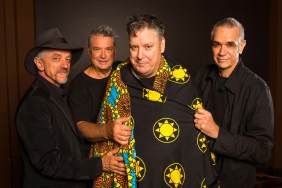For many fans, critics, riot grrrls and music aficionados alike, no band did things quite the way Sleater-Kinney did things. Their already peculiar set-up — two lead vocalists, two lead guitarists, no bassist — was pushed out into an even further niche through their punk and noise-driven voyages through the greater indie-rock spectrum.
Across seven studio albums, a handful of singles and a world-famous live show, Sleater-Kinney made high-kicking, boot-stomping rock & roll fun their business — and business, for their initial 12-year run, was good. Very good, even. The band parted ways on hiatus around the midway point of 2006, with no further plans to work together. It cut fast and it cut deep, particularly because there was no real explanation as to why it was all coming to an end.
It wasn’t as though we’d never see the three of them again, however. Along with forming a new band, Wild Flag, Carrie Brownstein found herself as an unexpected superstar of the comedy world. She co-created, wrote and starred in the series Portlandia alongside Saturday Night Live alum Fred Armisen; a show which went almost overnight from a cult sensation to one of the most popular comedy shows on TV. It remains on the air to this day, and recently premiered its fifth season.
Drummer Janet Weiss, too, ended up in Wild Flag; as well as joining the backing band of Pavement lead singer Stephen Malkmus for a spell. She even ended up on one of 2013’s most bizarre releases. Drumgasm was a three-person drum solo that took up an entire LP, on which Weiss played with Soundgarden/Pearl Jam drummer Matt Cameron and Death Grips’ Zach Hill.
Corin Tucker, meanwhile, formed the Corin Tucker Band and dropped two well-received solo records, self-described as “mom rock.” The minds of Sleater-Kinney were still very much creative and working constantly — just not with one another.
This all changed in 2014’s dying moments, when it was revealed that the three were back together. Not just for a one-off or some nostalgic shows — there was business to attend to in the form of their eighth studio album. The record in question, No Cities to Love, is finally out in the world. Music Feeds spoke with Janet Weiss from her home in the band’s native Portland, in an attempt to uncover just what it was that reformed the trio after all this time.
Watch: Sleater-Kinney – No Cities To Love (ft. Andy Samberg, Gerard Way, Fred Armisen & more)
Music Feeds: It’s so strange to be talking about Sleater-Kinney again in the present tense…
Janet Weiss: I know, right? I’m still getting used to it myself. [Laughs]
MF: Of course, we all discovered late last year that Sleater-Kinney was alive and kicking once again with the release of the box-set, Start Together. That must have been a real This is Your Life moment for you guys, basically having everything that you’ve ever worked on together collated in the one place.
JW: It was really moving. It’s such a beautiful boxset – and it’s so weighty! It actually surprised me how much music was actually in there. It really gave me and the rest of us a real sense of pride and a sense of perspective. It was a pretty moving experience to hold that in my hands for the first time.
MF: Normally, it’s pretty clear to see the motives behind a reunion. Unfortunately, a lot of the time, it comes down to the money. With Sleater-Kinney, though, it feels more like a matter of there being unfinished business. Is that a fair assumption?
JW: That’s a great way to put it. When we stopped playing in 2006, it didn’t feel like we were stopping forever. We just really felt like we needed a break. As the years go by, you don’t want to feel as though you’ve missed your opportunity to say what you need to say. The timing felt right for us.
We need to put in a lot of energy, a lot of emotion… a lot of ourselves goes into this band. It’s not something that you can do half-heartedly. It takes a lot of muscle from the three of us to make this thing go. We wanted to make sure that all three of us were in a position that we could give to the band what we needed to make it work. We wanted to make our best record.
MF: From your perspective, do you think that’s something that you’ve achieved on No Cities to Love?
JW: I don’t know. [Laughs] I hope so! I’m really happy with how it turned out. We worked hard on it. There wasn’t a lot of preciousness about the handling of these songs. We really looked at them objectively and examined them. Are these good enough? Are the choruses we’ve done good enough?
We spent a lot of time writing and rewriting even just the smallest parts. Carrie [Brownstein, guitarist/vocalist] would sometimes write four different melodies for the same chorus, just to push and refine further. We were all a lot more flexible, in that way, on this record. It was about checking our egos at the door and being the best musicians that we could possibly be.
MF: You brought back John Goodmanson to produce the album, who you guys worked with on Dig Me Out, All Hands on the Bad One and One Beat. Did you all immediately know when you were making No Cities to Love that he was the man for the job?
JW: Not at first, actually. Not from the start. We didn’t really know what the songs were at first. It takes awhile to become familiar with what you’re writing. I don’t think we really knew what we were going for until we were in the studio and tracking them.
John knows us so well. He wasn’t trying to make a quintessential Sleater-Kinney record. He wasn’t attached to any part of our band — he just believes in us. He believes in us as musicians and as players. He had a bunch of new ideas, and so did we. He really wanted to mess with things the way we did — he really wanted to turn it around.
Watch: Sleater-Kinney – Bury Our Friends (ft. Miranda July)
MF: Where did the record begin? Which of the songs to make the album was the first to take form?
JW: I always tend to think that the last song that you write can be the best one. The first one that you write tends to feel the most like what you’ve done before, whereas the last one is almost always the most different and the most adventurous.
It’s funny — the song we actually finished the last was the first that most people heard, which was Bury Our Friends. We even ended up going back to it, even after we’d tracked it. I re-tracked the drums and changed a few things. Carrie had some great ideas for the drums, especially when it came to the bridge. We kept working on A New Wave for a long time, as well. Carrie had this riff and wouldn’t let it go, and I’m glad she didn’t. I’m really happy with that song’s final form.
MF: The dynamic between the three of you has always been interesting. When you have both Carrie and Corin [Tucker] adding in guitar and vocals, they’re often doing completely different things to one another and yet they tessellate and complement one another perfectly. When it comes to your role, it often feels like you’re either tempering their storm or driving their riffs to the next level. What influenced your playing on this record?
JW: At first, it started with just the three of us in a room, just improvising and playing some old songs to get back into the rhythm. It became pretty clear early on, though, that Carrie and Corin need to hole up together and map out what they wanted to do. Their playing is so intrinsic and so intertwined — they’re so connected when they’re playing guitar together. It was a matter of reacquainting with their style and re-learning this language that they have. For the most part, they were writing guitar parts and bringing them to me, and then I would have to envision what direction I wanted to take it from there.
MF: A lot of the attention definitely lands on the other two. Do you ever feel left out of the songwriting process?
JW: Not at all! I’m open to anything. As long as the music’s good, that’s my only stipulation. There’s a lot of different ways of writing music. On [previous album, 2005’s] The Woods, the writing stemmed from a lot of jamming and improvising that we were doing together. [1997’s] Dig Me Out was written closer to the way we wrote this record, so it’s something that we’ve done in the past that has worked for us.
Carrie and Corin have always had this telepathy of sorts, this real connection. Part of my job in this band is to facilitate that. My job is to make that come to life. Whatever works is great for me.
MF: It was thrown about in a couple of interviews late last year that Sleater-Kinney were planning to be back in Australia sometime in 2015. Is that still on the cards?
JW: I hope so!
Sleater-Kinney’s eighth album, ‘No Cities To Love’, is out next Friday, 23rd January. Stream it in full below, and read our review here.












